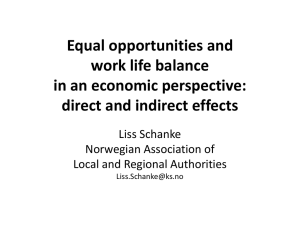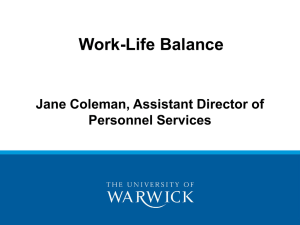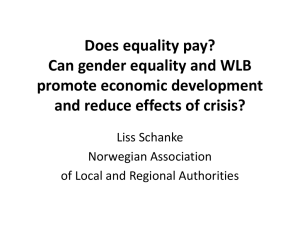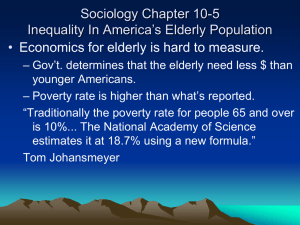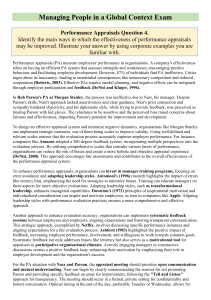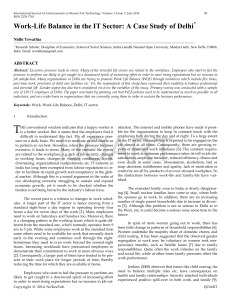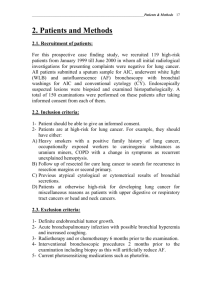Ms Liss Schanke
advertisement
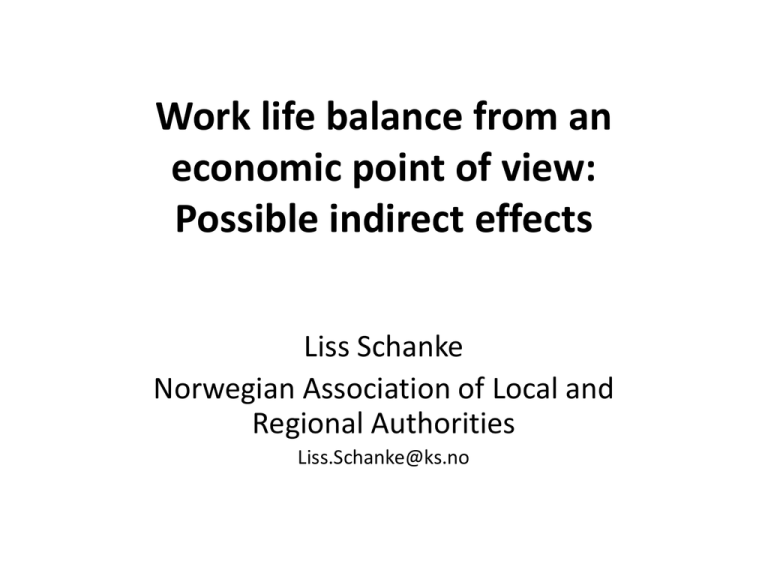
Work life balance from an economic point of view: Possible indirect effects Liss Schanke Norwegian Association of Local and Regional Authorities Liss.Schanke@ks.no Possible indirect effects • • • • No easy answers Short and long term No standard answers Will vary between countries and cultures • Not the same context Spain and Norway –not the same answers Effects of unemployment • Effects on unemployed adults, youth re. motivation, capacity • Effects on children, friends, siblings • Effects of unemployment on taxes/pensions • Effects of «unregistered labour market» on business competion/quality Effects of kindergartens • On demographic growth • On parents’ possibility for education/employment • On children’s capacity and motivation for education – especially immigrant or marginalized children • On public and private sector competence in a global competitive economy Effects of postponed retirement • Continued payment of income taxes – reduced payment of pensions • More active elderly people - happier and healthier • 2012: EU year for the active elderly • Foto jobb Effects on productivity • Does flexible working hours/place give more satisfied workers? • Does more satisfied workers give increased productivity? • Is working 08-16 more productive than 08-20? • Is presentism productive? • Best Practice: Flexibility in Bærum Effects on social capital? • Many forms of capital, economic, cultural, social • Putnam: «SC is the collective value of all social networks and the inclinations that arise from these n. to do thing for each other» • More networks with 08-16.00 than 08-20? • 2011: EU voluntary year • Best Practice: Voluntary centre in Mandal Effects on male role? • Work life balance may imply a new role for men in their own family • WLB may open up new jobs for men in kindergartens, institutions for elderly etc. • More men in care may imply higher total quality of care • Best Practice: REFORM and Free Choice Vest Agder General effects of economic equality Main message: Society benefits from greater economic equality – not only the poor – but the whole population. Examples: Life expectancy, literacy, infant mortality, homicides, imprisonment, mental illness, drug addiction, trust………….. Income differences between rich and poor in some countries Health and Social Problems are Worse in More Unequal Countries Index of: • Life expectancy • Math & Literacy • Infant mortality • Homicides • Imprisonment • Teenage births • Trust • Obesity • Mental illness – incl. drug & alcohol addiction • Social mobility Source: Wilkinson & Pickett, The Spirit Level (2009) www.equalitytrust.org.uk WLB indirect economic aspects: tentative conclusions • Challenges in all countries, e.g.pay gap, immigrant employment, part time gap • WLB may increase with political cooperation, social processes and social dialogue • Important present and future topic for cooperation between Spain and Norway
